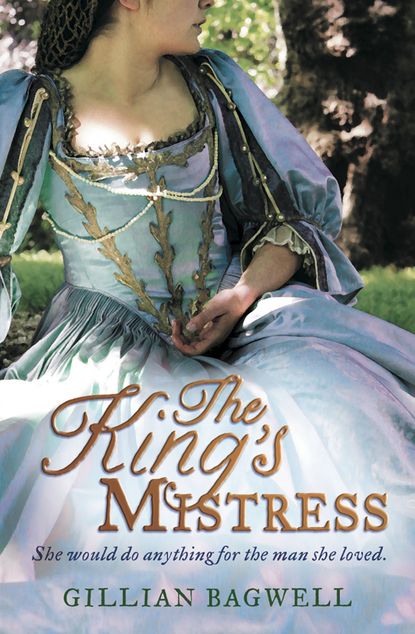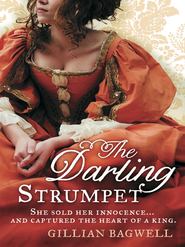По всем вопросам обращайтесь на: info@litportal.ru
(©) 2003-2025.
✖
The King’s Mistress
Настройки чтения
Размер шрифта
Высота строк
Поля
“How lovely,” she said, touching the softness of the leather. “Like the colour of bluebells. Now I shall welcome the first day of frost.”
She met his eyes and smiled. He really was very handsome, she thought. Piercing blue eyes above high cheekbones, a strong jaw, no trace of grey yet in his wavy brown hair, though she knew he was more than ten years older than she. Why did she feel no thrill of happiness and excitement, nothing but a vague wish that the evening was over and done with?
As the meal went on, the news from the north dominated the conversation. The exiled young King Charles had arrived in Scotland the previous summer from the Netherlands, and in recent months had been massing an army.
“I say His Majesty will not push into England now, or indeed soon at all,” Henry declared. “Lambert beat the king’s troops under General Leslie scarcely a month ago, and without more men—many more men—he has no hope.”
“Exactly,” Jane’s brother Richard cried. The faint spray of freckles stood out on his cheeks when he was in the grip of a strong emotion, as now, making him look younger than his twenty-six years. “Which is why I say he will cross the border, and that England will rally to his banner. The Papists in the north and his supporters throughout the country know that the time is now.”
“What say you, Sir Clement?” Thomas Lane asked, and all eyes turned to the guest. He had served as a captain under John, and Jane wondered if he would fight again if it came to it. He took a thoughtful swallow of wine before answering.
“I agree with Richard. Cromwell has divided the king’s forces, and marched on Perth. All is in confusion, but His Majesty may seize some advantage from that by moving decisively now.”
“But he has not enough troops to win,” Henry argued, his voice rising. He, too, had fought in the wars, serving as cornet in John’s regiment. “He must have help from England, but the Royalists who would help him are afraid, have suffered so much already during the wars. John’s house and lands were confiscated! My uncle here had all his horses and cattle seized and sold, the profits going to the Stafford Committee. And did not the villains just assess you once more, Uncle?”
“Yes, indeed,” Thomas said. “A hundred pounds in January.”
His voice was calm, but Jane knew the depth of feeling that lay beneath. Her father had been a justice of the peace, but the title had been stripped from him when the war began and the Lanes had fought on the side of the king, and since then he had regularly been burdened with onerous levies and fines.
“Exactly!” Jane’s brother William cried. He pounded a fist on the table, making the silverware rattle. “Those who are known to be for the king must beg for a pass to travel more than five miles from home, have lost their property, and look fearfully on their neighbours, not knowing who is friend and who is foe, and wondering what might be taken from them next.”
“The more reason we have to stand now,” John said quietly.
At forty-two, he was the oldest of the siblings, and his service as a colonel under the old king gave his opinion further weight. Even his two littlest daughters ceased their whispering, and all eyes turned to him. His blue eyes were grave, and even as he sat still, surveying the gathering, it seemed to Jane that she could see the weight of authority and command on his broad shoulders. A raven’s hoarse cry tore through the tense silence.
“I have stayed at home and been silent long enough,” John said. “If the king crosses the border and calls for his subjects to join him, I mean to go.”
Jane felt a surge of pride as she looked at him. If I were a man, she thought, I would hope to be just such a one as he is.
A babble of voices greeted John’s news.
“Oh, John, no!” Jane’s mother, Anne, cried out. “You served honourably and well for years during the wars. Your duty is to your family now.”
“If you go, I’m with you, John,” Henry said. “When do you think of leaving?”
John glanced at his wife. She had said nothing, but the set of her mouth showed she battled strong emotions.
“It will be no use to go off half-cocked,” he said. “I’ll raise as many men and horses as I can and ensure that we’re well provided, so that when His Majesty summons us we can be of real use.”
“Then put me down as one of yours as well, brother,” Richard said.
“Not you, too, Dick!” their mother cried. “Two from the family is more than enough.”
“I am no child, Mother!”
“But think of the cost!” Anne turned to her husband. “Dissuade him, I pray you, Thomas!”
“Mother, how can you argue that they should not go to the aid of the king?” Jane cried with sudden impatience. “He has need of all the help he can get. It’s the crown—the crown and the future of the monarchy. The chance for wrongs to be righted, and the topsy-turvy world to be set back in place. I’d go myself, was I a man.”
Her mother gave a little cry of fear and horror, and Withy laughed shrilly.
“I think you would, too.”
“The Penderels from Whiteladies might come,” Walter mused, hitching his chair close to John. “And perhaps Charles Giffard from Boscobel.”
“Yes,” John said. “And no doubt men from among our tenant farmers, and many others. We’ll go to Walsall next market day and make our plans known.”
“So openly?” Sir Clement asked. “Do you trust your neighbours?”
“Some of them,” John said.
“But others wish us ill,” Richard spat, “and will surely report to the Stafford Committee anything they take amiss.”
“Then we’ll act quickly,” Henry said, leaping to his feet, “and be gone as soon as we may.”
After dinner, as the ladies prepared to withdraw to the house, Sir Clement stood and walked with Jane to the door of the banqueting house. Her female relatives exchanged significant glances and made themselves scarce.
Wonderful, Jane thought. No private conversation can take place but I will be expected to report the results. Sir Clement smiled, as if understanding her thoughts, and spoke in a low voice.
“Will you not walk with me a little, Jane, now that we have a moment to be alone?”
Jane had known he’d be likely to speak his mind tonight, and had hoped to put off the conversation, for she had no clear answer for him, and no wish to cause him pain. He stood looking down at her, his blue eyes solemn, and she nodded. They strolled towards the house in silence. The western horizon was pale pink, shot with gold, and the first stars were just beginning to twinkle in the deepening blue overhead. A hush hung over the land, and Jane inhaled the scent of blossoms heavy on the breeze. Soon it would be autumn, but tonight was a perfect summer evening and she didn’t want to go inside.
“Let’s sit in the summerhouse,” she said. “No one will disturb us there.”
They sat side by side on an upholstered bench. The men’s voices drifted from the banqueting house, still rising and falling in excited conversation.
Clement took Jane’s hand and looked at it, as though he had never noticed it before.
“So small,” he said. “And yet so strong. You’d make a fearsome soldier, Jane, and I honour your courage and your spirit, no matter what your sister may think.”
“Withy has no good opinion of me, whatever I do.”
“I think you know already what I mean to ask. I’ve long had such admiration and affection for you, and it would make my life complete if you were more to me than a friend, but a cherished partner. Jane, would you grant me the supreme happiness of consenting to be my wife?”
Jane forced herself not to sigh or to withdraw her hand. She looked into his eyes, shining at her in the shadows, kind and calm. Why could she not just say yes?
“You do me great honour, Sir Clement. You possess all the qualities that women prize in a husband, and I probably have no need to tell you that my mother and sisters are all aflutter to hear what they hope will be happy news very shortly. And yet I must ask you to indulge me by allowing me some time to consider.”
“Of course. I have no wish to hurry you.”
His lips were set as if in pain, and Jane’s heart contracted. He was a good man, honourable, brave. What was wrong with her?
“I beg you to tell me,” he said, “if there is some fear that you have, or some flaw in myself that I may mend?”
“No. The flaw is in me. I long for—I know not what. For adventure, I would say, did I want to leave myself open to your mockery.”
“I would never mock you, my dear. I don’t know what adventure you hope for, but no doubt you’re right that I cannot offer you vivid excitement. I’m thirteen years your senior, no dashing young suitor to carry you off. I watched, enraptured, as you turned from a charming girl into a lovely young woman. I offer you my esteem, respect, and love. I can provide for you a comfortable home, even a grand one, if I may say so with modesty. I would protect you, honour you, and endeavour to make our life together as happy as it may be, but more than that I am powerless to give.”






